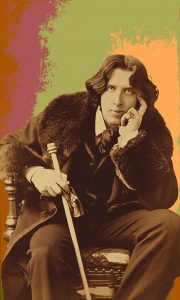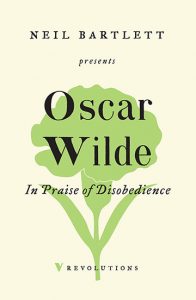The soul of Oscar Wilde
I had often seen Oscar Wilde described as a socialist for his essay ‘The Soul of Man Under Socialism’, but I’d never read it. So when it was published in a recent selection of Wilde’s works (Oscar Wilde. In Praise of Disobedience, edited by Neil Bartlett, Verso, 2020), this seemed to me an opportunity to fill that gap. I was more familiar with the works Wilde is much more famous for – his plays (e.g. The Importance of Being Earnest), his poetry (e.g. The Ballad of Reading Gaol), and his novel, The Picture of Dorian Gray, and of course with his spectacular fall from grace when he was imprisoned for sodomy in an age that criminalised homosexuality and brought the writer to poverty and exile before he died in 1900 at the age of 46.
In a beautifully written introduction to this collection, the editor describes ‘The Soul of Man Under Socialism’ as ‘the writing of a man who knew all about being wounded, worried, maimed, and in danger’. And there’s no doubt that this is a tormented piece of writing. Its main theme is the quest for better social circumstances in which artists and all people can express their being freely and openly and without fear of outraging existing norms or incurring interdiction or punishment. But, given the essay’s title, I was rather surprised that a good deal of it is not specifically about socialism or indeed about any kind of politics at all. As much as anything else it’s about the role of art in human society and in particular the position of artists in Wilde’s time and the problems they faced. The connection of this to socialism is that, in what Wilde sees as a socialist society, artists would not have to abide by the strictures and constraints imposed on them in his own society. So we can agree with the editor of this volume that what we have here, at one level at least, is ‘an aesthetics of radicalism’.
But what is the ‘socialism’ of the title that Wilde sees as being necessary and through which man’s true ‘soul’ would be capable of free expression? In many ways it does seem strikingly close to the Socialist Party’s version of socialism – a world of common ownership, voluntary cooperation and free access – summed up as follows early in the essay: ‘Socialism, Communism, or whatever one chooses to call it, by converting private property into public wealth, and substituting cooperation for competition, will restore society to its proper condition of thoroughly healthy organism, and ensure the material well-being of each member of the community.’ There is much else along these lines – from ‘the proper aim is to try and reconstruct society on such a basis that poverty will be impossible’, to ‘it is only in voluntary associations that man is fine’, to ‘the true perfection of man lies, not in what man has, but in what man is’, and ‘when private property is abolished there will be no necessity for crime, no demand for it; it will cease to exist’. On issues like authority and human nature too, Wilde is strikingly ‘modern’ in his thought: ‘All authority is quite degrading (…) It degrades those who exercise it, and degrades those over whom it is exercised’ (…) ‘The only thing that one really knows about human nature is that it changes’.
But Wilde also has another axe to grind, one which at first sight may seem to run contrary to the vision he initially outlines. He tells us, repeatedly, that he prizes above all what he calls ‘individualism’. In a different context this could of course appear a way of describing the ‘every man for himself’ ethic which is at the heart of capitalist society. But Wilde sees ‘individualism’ not as the war of each person against the other, but rather a way of realising and releasing human energies in each individual to allow them to fulfil their personal potential in building a free cooperative society, a society in which ‘every man must be left quite free to choose his own work’. In Wilde’s view ‘private property has set up an Individualism that is false’, crushing true individualism, which for him is not egotism, since ‘the egotist is he who makes claims upon others, and the Individualist will not desire to do that’. But, he goes on, ‘when man has realised Individualism, he will also realise sympathy and exercise it freely and spontaneously’. And his exaltation of individualism ends on the most exalted of notes: ‘With the abolition of private property, then, we shall have true, beautiful, healthy, Individualism. No one will waste his life in accumulating things and the symbols for things’.
 This is Wilde’s vision, but what of the means to achieve it? As the editor of this collection quite rightly points out, ‘the thing (…) that will surprise a modern reader most – given its title – is that it proposes no political or politicised action of any kind’. In other words, it contains no prescriptions on how the ‘adjustments’ to the society Wilde advocates would take place. So though he seems to be advocating socialism in the Socialist Party’s terms, he does not follow the Socialist Party’s proposal to achieve it, i.e. through political action via the spreading of socialist consciousness followed by democratic action through the ballot box. But though Wilde proposes no specific means of achieving socialism, he does make clear that he is not looking for the ‘socialism’ of state control (‘It is clear, then, that no Authoritarian Socialism will do.’). And so of course in adopting such a position, Wilde would not have found favour with many of the so-called ‘socialists’ of his day, for example the Fabians, who advocated state legislation to change social conditions. It must be said, however, that there is some residual attachment to the state in Wilde’s thinking, perhaps stemming from the same kind of failure of the imagination to be found in many of today’s ‘anti-capitalists’, a failure to imagine radically enough. In Wilde’s socialism, the state still does seem to have an existence, not apparently as a governing body, but, as he puts it, ’a voluntary association that will organise labour, and be the manufacturer and distributor of necessary commodities’. But, there again, this may be a question of terminology and what Wilde is describing is socialist organisation under another name.
This is Wilde’s vision, but what of the means to achieve it? As the editor of this collection quite rightly points out, ‘the thing (…) that will surprise a modern reader most – given its title – is that it proposes no political or politicised action of any kind’. In other words, it contains no prescriptions on how the ‘adjustments’ to the society Wilde advocates would take place. So though he seems to be advocating socialism in the Socialist Party’s terms, he does not follow the Socialist Party’s proposal to achieve it, i.e. through political action via the spreading of socialist consciousness followed by democratic action through the ballot box. But though Wilde proposes no specific means of achieving socialism, he does make clear that he is not looking for the ‘socialism’ of state control (‘It is clear, then, that no Authoritarian Socialism will do.’). And so of course in adopting such a position, Wilde would not have found favour with many of the so-called ‘socialists’ of his day, for example the Fabians, who advocated state legislation to change social conditions. It must be said, however, that there is some residual attachment to the state in Wilde’s thinking, perhaps stemming from the same kind of failure of the imagination to be found in many of today’s ‘anti-capitalists’, a failure to imagine radically enough. In Wilde’s socialism, the state still does seem to have an existence, not apparently as a governing body, but, as he puts it, ’a voluntary association that will organise labour, and be the manufacturer and distributor of necessary commodities’. But, there again, this may be a question of terminology and what Wilde is describing is socialist organisation under another name.
So, what was my impression on reading this much-mentioned work for the first time? Was I enthused about Wilde’s vision of socialism or was I disappointed? Definitely more the first than the second and, especially given the time at which the work was written and the circumstances of that time, I would want to forgive certain flights of fancy by the author (for example something of an attachment to Christianity or at least to the figure of Christ), a tendency towards sweeping statements (part of what the editor describes as Wilde’s ‘firework display of opinion’) and the occasions on which he does not seem to entirely share the vision of a socialist world and how to achieve it of other socialists of his day (e.g. Marx or William Morris), a vision which continues to be entirely relevant today.
HOWARD MOSS
